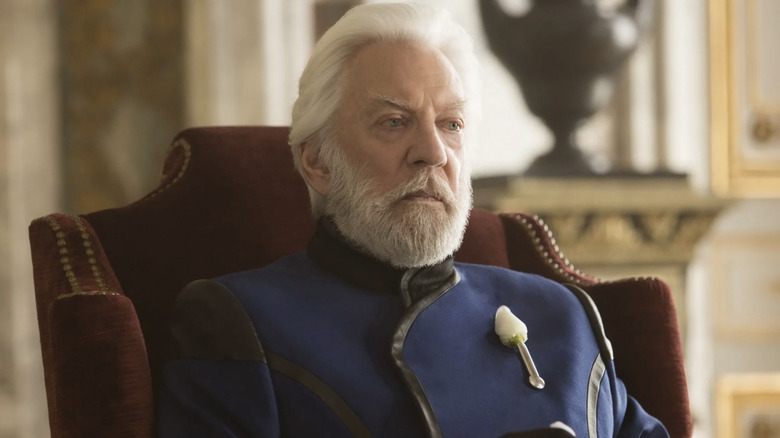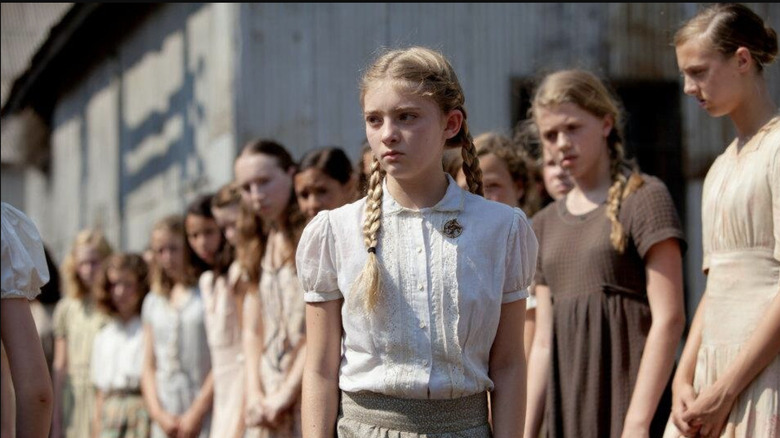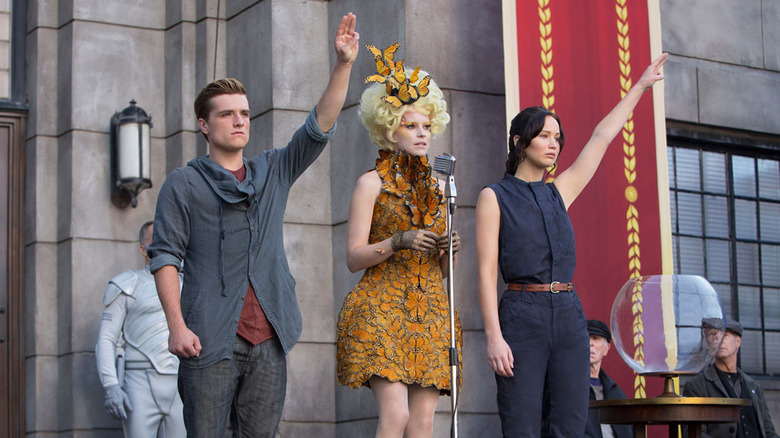The Hunger Games Aren't Very Popular In The Ballad Of Songbirds And Snakes
The 2020 prequel "The Ballad of Songbirds and Snakes" still hasn't received as much buzz as any book from the original "The Hunger Games" trilogy, and that's a shame. The prequel centers around a teenaged Cornelius Snow, long before he becomes President of Panem, as he's assigned to mentor a tribute in the upcoming 10th-ever Hunger Games tournament.
What's most impressive is the way the prequel fleshes out early Panem. The book takes place inside the Capitol just a decade after the end of the war that started the first Hunger Games, and the place is far from the luxurious city it was in the original books or movies. When it comes to the upcoming film adaptation of the prequel, it'll be exciting to see how they go about this fresh, early depiction of a place we thought we'd already gotten to know.
Of course, the main difference with this depiction of the Capitol is not time, but perspective. "The movies up until now are all from the point of view of the districts," producer Nina Jacobson explained to Total Film Magazine. "This film is through the eyes of the Capitol." While the prequel portrays the Capitol civilians as wounded and angry over the aftermath of the recent war, at the start of the book they aren't quite angry enough to be on board with watching a bunch of kids kill each other for entertainment. As Jacobson put it:
"It's the 10th Games, and they've been so brutal, so nobody wants to watch them. They're not celebrated. It's seen as a horrible task to throw 24 innocent people into an arena ... They're usually brutal and over very quickly."
Changing Capitol Citizens' Minds
Like the source material, the movie will introduce us to the new head gamemaker Dr. Volumnia Gaul (Viola Davis), whose goal is to turn the Hunger Games into a more entertaining version of itself. We'll likely get the disturbing treat of watching Gaul and the other characters excitedly brainstorm ideas for the games that we've seen firmly established by the first Hunger Games film. The idea of allowing citizens to take bets on the game, and allowing the tributes to compete for sponsorships, are ideas that first come to life here.
"She [Gaul] is trying to find a way to keep the Games relevant as she thinks they're essential to maintaining control," said Producer Nina Jacobson. As a result, the movie will cover a lot of the Capitol's growing propaganda campaign, as people like Gaul try (with great success) to force their citizens to accept something they know deep down is immoral. Considering we've seen Viola Davis play plenty of cold, scheming figures before, it's likely she'll knock the role of Volumnia Gaul out of the park.
The book has young Cornelius Snow take part in Gaul's team, and it's his participation in making the games more exciting that paves the way for him to take control of the entire nation. Unlike the trilogy, the book is a quiet, introspective look into the mind of a budding psychopath; it's written with no intention to justify or retcon Snow's actions but to flesh them out more than the original books ever could. The story of how the Hunger Games evolved is closely intertwined with Snow's own rise to power, which gives this movie plenty of exciting material to work with.
The political parallels
Hopefully, the movie also won't shy away from the social commentary of the books either, in which the Capitol is a clear metaphor for the United States and other first-world nations, and the districts are the developing countries we exploit. In the prequel, it's casually mentioned early on that the Reaping Day is held every year on July 4. The reveal that the day once used to celebrate America is now being used to pick out child sacrifices from the Districts is definitely provocative, to say the least. It takes the original books' critiques of America (and imperialism in general) and makes them even more explicit.
More specifically, the plot of "The Ballad of Songbirds and Snakes" seems to specifically draw inspiration from the 2000s-era War on Terror rhetoric. The Capitol government takes the genuine grief its citizens feel over the war and uses it to manipulate the public into approving of its questionable methods of maintaining control. The book also critiques nationalism and the way it can be used to skew people's sense of morality; one of the more pointed moments is when a tribute carves up the Panem flag and the Capitol citizens — who are in the middle of forcing a bunch of kids to kill each other for entertainment — are morally outraged at the "sanctity of the national flag" being disregarded.
It's one of the things that put the "Hunger Games" novels and movies a step above the other YA series of its time; they're designed to make its readers and viewers question their own nation and their own place in it. As this new prequel film dives back into the sadly-familiar city of the Capitol, we hope they don't lose the original films' satirical edge.


